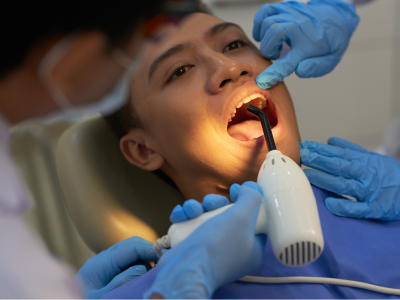How Does Dental Crown and Bridges Improve Your Chewing Ability?

Strong 8k brings an ultra-HD IPTV experience to your living room and your pocket.
Dental crowns and bridges are popular restorative treatments designed to restore the function and aesthetics of damaged or missing teeth. These treatments are highly effective in improving a person's chewing ability, which is vital for overall oral health and quality of life. If you're considering Dental Crown and Bridges Dubai, understanding their impact on chewing can help you make an informed decision about your dental care. This article explores how dental crowns and bridges improve chewing efficiency and contribute to better oral function.
What Are Dental Crowns and Bridges?
Before delving into how they enhance chewing, let's define dental crowns and bridges.
Dental Crowns: A crown is a tooth-shaped cap placed over a damaged or weakened tooth to restore its strength, shape, and size. Crowns are often used to protect teeth after root canal treatment, cover a large filling, or improve the appearance of discolored teeth.
Dental Bridges: A bridge is a fixed dental restoration used to replace one or more missing teeth. It consists of one or more artificial teeth (pontics) anchored by crowns placed on adjacent teeth. The bridge "bridges" the gap left by missing teeth, restoring function and aesthetics. Both crowns and bridges play a significant role in restoring oral health by improving the ability to chew efficiently, thereby improving overall digestion and comfort.
Restoring Normal Chewing Function:
Chewing is a complex process that involves the coordination of your teeth, jaw, and muscles. When teeth are damaged or missing, it can become difficult to chew properly, leading to discomfort, difficulty eating certain foods, and even digestive issues.
Replacing Missing Teeth with Bridges:
One of the most significant benefits of dental bridges is their ability to restore the function of missing teeth. When teeth are lost, the surrounding teeth can shift out of alignment, making it harder to chew. A bridge fills this gap by providing a solid replacement, which helps restore normal biting and chewing patterns.
Bridges restore the occlusion (bite) by ensuring that the upper and lower teeth align properly during chewing. This makes it easier to chew food evenly and with less discomfort, reducing the risk of uneven wear on the remaining teeth.
Strengthening Weakened Teeth with Crowns:
Dental crowns can improve chewing ability by strengthening weakened or damaged teeth. For example, a tooth that has been treated with a root canal may become fragile, making it difficult to chew efficiently. A crown placed over such a tooth restores its structure and prevents further damage. With the added strength of a crown, the tooth can withstand the pressure of chewing, improving its function.
Additionally, crowns are custom-made to fit the shape and size of the natural tooth, ensuring that the bite is aligned and chewing can occur as it would with a healthy tooth. This alignment helps distribute chewing forces evenly across the teeth, reducing the likelihood of discomfort or further tooth damage.
Enhancing Chewing Efficiency:
Effective chewing requires the ability to break down food into smaller, digestible pieces, a function that is directly influenced by the number and quality of your teeth. Both crowns and bridges improve chewing efficiency in several ways:
Restoring the Full Set of Teeth:
Missing or damaged teeth can compromise the ability to chew food properly. For instance, without molars, it becomes difficult to grind food, which may lead to improper digestion and discomfort. A dental bridge can restore the full set of teeth, enabling the patient to chew more effectively.
Likewise, crowns restore the full functionality of damaged teeth, improving the ability to bite and grind food efficiently. This helps patients eat a wider variety of foods, such as crunchy vegetables and tough meats, which they might otherwise avoid due to discomfort.
Preventing Overloading on Remaining Teeth:
When teeth are missing or damaged, the remaining teeth often bear the brunt of the chewing forces. This overloading can lead to additional wear, sensitivity, and even tooth damage. By filling the gaps with a bridge or reinforcing damaged teeth with crowns, the chewing forces are distributed more evenly across the mouth. This helps prevent undue stress on any single tooth, preserving overall oral health.
Improved Jaw Function:
The jaw plays a crucial role in the chewing process. When teeth are missing or weakened, the jaw may have to compensate by exerting excessive pressure on the remaining teeth. This can result in jaw pain, headaches, or TMJ (temporomandibular joint) disorders. Crowns and bridges help restore proper tooth alignment, allowing the jaw to function naturally. This reduces the risk of jaw strain and improves overall chewing function.
Contributing to Oral Health:
Beyond improving chewing ability, dental crowns and bridges contribute to long-term oral health in several important ways.
Preventing Further Tooth Damage:
By covering damaged or weakened teeth, dental crowns protect them from further decay, fracture, or wear. This helps preserve the natural tooth structure and reduces the risk of needing more extensive treatments in the future.
Bridges also help prevent the remaining teeth from shifting, which can cause misalignment and further oral health issues. Properly aligned teeth are easier to clean, reducing the likelihood of cavities, gum disease, and other oral problems.
Supporting Overall Digestion:
Chewing is the first step in the digestive process. When teeth are not functioning properly, food is not broken down effectively, which can lead to digestive problems such as indigestion or bloating. By restoring the ability to chew properly, dental crowns and bridges support overall digestion and contribute to better nutritional intake.
Enhancing Confidence and Comfort:
Chewing discomfort can discourage people from eating a variety of foods, leading to poor nutrition and dissatisfaction with meals. Crowns and bridges improve comfort by restoring normal chewing function, allowing patients to enjoy their food without pain or difficulty. This improvement in comfort and function often leads to enhanced confidence, as individuals can smile, eat, and speak without concern.
Conclusion:
Dental Crown and Bridges in Dubai offer significant improvements in chewing ability by restoring tooth function, enhancing chewing efficiency, and promoting overall oral health. Whether you're missing a tooth or dealing with a weakened one, these treatments can restore your ability to chew comfortably and effectively. By investing in dental crowns or bridges, you're not only improving your ability to eat a variety of foods but also enhancing your overall quality of life. If you're experiencing issues with chewing, consult with a dental professional to explore the best options for your needs.
Note: IndiBlogHub features both user-submitted and editorial content. We do not verify third-party contributions. Read our Disclaimer and Privacy Policyfor details.







